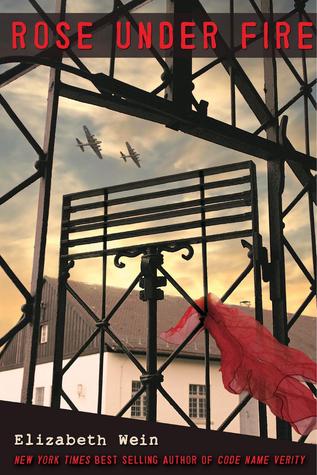War, oppression, and torture, oh my. It was a difficult reading week, with books that were pretty slow reads. Hopefully, I'll get my hands on some lighter reading for next week.
Rose Under Fire by Elizabeth Wein
Code Name Verity, book 2.
As in the first book, the events take place during WWII. Rose Justice is an American who comes to England to work as a transport pilot. Though she's not a soldier and carries no weapons, she still ends up as a prisoner of the Nazis. She is taken to the infamous women's concentration camp, Ravensbruck. This book is fiction, but the author obviously did a great deal of research.
The middle part of the book reads more like a survivor's memoir than a piece of fiction, as the conditions Rose encounters are based on real conditions at the camp during that time. At the camp, Rose meets a group of Polish prisoners called the Rabbits because they were subjected to horrific medical experiments by the doctors on staff at Ravensbruck. The Rabbits are determined to tell the world about their treatment, but Rose doesn't have the heart to tell them that there have been rumors, but that no one believes them (no one WANTS to believe them) because they are too terrible to be true. As her captivity stretches on and the war nears its end, the Nazi death machine revs into high gear as they resolve to cover up their crimes by leaving no witnesses.
Rose struggles to hold on to her hope of survival. She says, "Hope is the most treacherous thing in the world. It lifts you and lets you plummet. But as long as you're being lifted you don't worry about plummeting.”
Engaging, well-researched YA historical fiction. Recommended for mature readers with an interest in WWII and badass female characters.
If You Could Be Mine by Sara Farizan
Sahar and Nasrin are both 17 and live in Iran. They've been in love for as long as they can remember. Unfortunately, if anyone finds out, the penalty will be a public hanging. When Nasrin's mother announces that she will marry a handsome older doctor, Nasrin agrees and assumes that her relationship with Sahar will continue; she'll have a comfortable life and continue to have a clandestine relationship with Sahar.
Sahar knows Nasrin's plan won't work and she's desperate to find a way to stop the wedding. When she discovers that sex reassignment surgeries are not only legal, but paid for by the government, she decides to become a man and marry Nasrin herself.
Okay, so here's where the story lost me for a while. Sahar is smart and plans to become a doctor. I found it very hard to believe that she would assume she could just have this major, life-altering surgery without consulting ANYONE about it (even Nasrin) and then be fully recovered in the month before the wedding. I get that she's blinded by love, but it irked me that she never considered LEAVING FRIGGING OPPRESSIVE IRAN, but instead jumped right to becoming a man.
I'll avoid spoiling the ending, but let's just say that it was maybe a little hopeful.
********************************************
This one was my book club's selection for this month and not on the YALSA list:
The Last Train West by Jean M. Prestbroten
I've read many stories about the Nazi's victims, but not much has been written about how WWII affected the everyday lives of citizens who may or may not have supported the war in the first place. I found Gretel's story interesting and wasn't at all bothered by the blending of fact and fiction. This, in fact, was the book's greatest strength. What makes history interesting is the stories of the people who lived it, not so much the dates and places.
On the downside, this is a self-published book that could certainly benefit from a competent editor, more research, and the input of an actual German speaker.








No comments:
Post a Comment